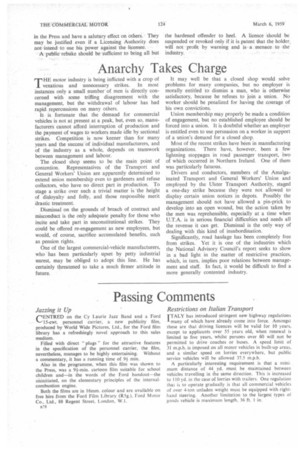Anarchy Takes Charge
Page 32

If you've noticed an error in this article please click here to report it so we can fix it.
THE motor industry is being inflicted with a crop of vexatious and unnecessary strikes. In most instances only a small number of men is directly concerned with some trifling disagreement with the management, but the withdrawal of labour has had rapid. repercussions on many others.
It is fortunate that the demand for commercial vehicles is not at present at a peak, but, even so, manufacturers cannot afford interruption of production and the payment of wages to workers made idle by sectional strikes. Competition is now keener than for many years and the success of individual manufacturers, and of the industry as a whole, depends on teamwork between management and labour.
The closed shop seems to be the main point of contention. Representatives of the Transport and General Workers' Union are apparently determined to extend union membership even to gardeners and refuse collectors, who have no direct part in production. To stage a strike over such a trivial matter is the height of disloyalty and folly, and those responsible merit drastic treatment.
Dismissal on the grounds of breach of contract and misconduct is the only adequate penalty for those who incite and take part in unconstitutional strikes. They could be offered re-engagement as new employees, but would, of course, sacrifice accumulated benefits, such as pension rights.
One of the largest commercial-vehicle manufacturers, who has been particularly upset by petty industrial unrest, may be obliged to adopt this line. He has certainly threatened to take a much firmer attitude in future. It may well be that a closed shop would solve problems for many companies, but no employer is morally entitled to dismiss a man, who is otherwise satisfactory, because he refuses to join a union. No worker should be penalized for having the courage of his own convictions.
Union membership may properly be made a condition of engagement, but no established employee should be forced into a union. It is doubtful whether an employer is entitled even to use persuasion on a worker in support of a union's demand for a closed shop.
Most of the recent strikes have been in manufacturing organizations. There have, however, been a few lightning stoppages in road passenger transport, iwo of which occurred in Northern Ireland. One of them was particularly fatuous.
Drivers and conductors, members of the Amalgamated Transport and General Workers' Union and employed by the Ulster Transport Authority, staged a one-day strike because they were not allowed to display certain union notices in depots. Possibly the management should not have allowed a pin-prick to develop into an open wound, but the action taken by the men was reprehensible, especially at a time when U.T.A. is in serious financial difficulties and needs all the revenue it can get. Dismissal is the only way of dealing with this kind of insubordination.
Significantly, road haulage has been completely free from strikes. Yet it is one of the industries which the National Advisory Council's report seeks to show in a bad light in the matter of restrictive practices, which, in turn, implies poor relations between management and staff. In fact, it would be difficult to find a more generally contented industry.




















































































































